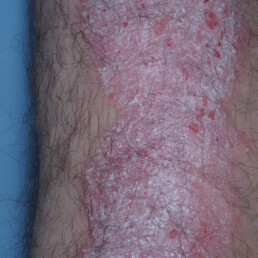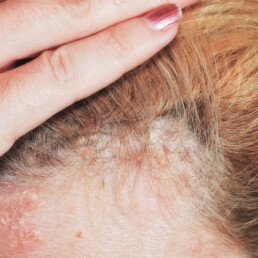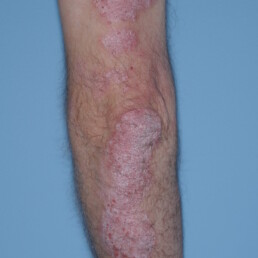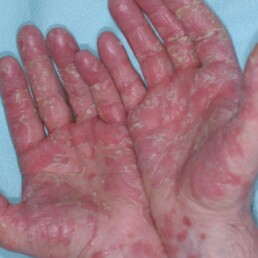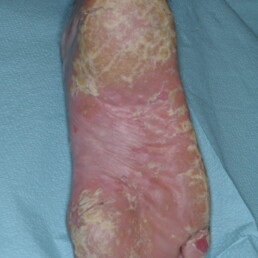Psoriasis is a common skin disease characterized by red plaques, covered by thick white scales, that can be anywhere on the body, including common areas like the elbows, knees, and scalp.
Psoriasis is a chronic (long-term) disease that affects about 7 million Americans – both males and females and the young and the old, although the late-20s is the average time in life that people first experience its symptoms. In its most typical form, called plaque psoriasis, itchy or sore plaques of thick red skin develop, commonly with silvery scales. These plaques can appear anywhere on the body, but the most common locations include the knees, elbows, scalp, legs, and buttocks. Psoriasis may also affect fingernails and the genitalia. Beyond plaque psoriasis, there are other types of psoriasis: guttate, pustular, inverse, and erythrodermic.
Skin is inflamed in psoriasis, due to an over-active immune system. Recently, researchers have discovered that people with more severe forms of psoriasis also have inflammation throughout the inside of the body. About a third of people with psoriasis also get psoriatic arthritis, a type of arthritis that causes joints and the tissues surrounding the joints to become inflamed and painful. Other internal diseases, notably heart attacks, strokes, diabetes, hypertension, and depression, are also associated with psoriasis. Doctors and researchers are trying to learn more about this new understanding of psoriasis, especially its association with heart disease.
Psoriasis is not contagious and you cannot catch it from other people. In many cases, there is a family history of psoriasis and researchers have identified genes linked to the disease. Flares, or times when the symptoms are worse, can be common and many people report stress, infection, cold weather and certain medications may trigger this worsening or flare. Moderate-to-severe psoriasis may significantly impact quality of life, as many studies have demonstrated.
Treatments for psoriasis have evolved over time. Oregon Medical Research Center is proud to have been a part of the effort to bring new treatments to people with this disease. Mild forms of psoriasis often respond to topical medications, such as steroid-containing creams. Systemic (internal) therapies, used for moderate-to-severe disease, include oral pills and injectable biologic drugs.
Dedicated to Psoriasis
Board certified dermatologists, Dr. Ehst and Dr. Hawkes, are dedicated to helping people with psoriasis.
Psoriasis Experts
Our team has more direct experience with the newly approved and studied medications than any other group in Oregon. We’ve been involved with every significant new medication approved for psoriasis since 1998.
Learn more about the treatments participants at Oregon Medical Research Center helped bring to psoriasis patients.
Access to New Options
While there have been many new treatments approved for psoriasis, there are still people who cannot access the newer treatments. Clinical studies may give you options you haven’t tried.
Be a part of the solution
Clinical studies give people with psoriasis the chance to help bring new treatments to others with the condition.
More Information is Always Better
Most doctors don’t have time to fully educate patients on available and upcoming treatments, but our research center environment allows our dermatologists the time needed.
Complimentary Consultation
Want to learn more about clinical studies and the newly approved medications? We always offer a complimentary one-on-one consultation with one of our dermatologists.
Want to learn more about clinical studies and the newly approved medications? We always offer a complimentary one-on-one consultation with one of our dermatologists.

